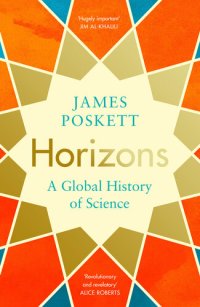
Ebook: Horizons: A Global History of Science
Author: James Poskett
A major retelling of the history of science from 1450 to the present day that explodes the myth that science began in Europe - instead celebrating how scientists from Africa, America, Asia and the Pacific were integral to this very human story
We are told that modern science was invented in Europe, the product of great minds like Nicolaus Copernicus, Isaac Newton, Charles Darwin and Albert Einstein. But this is wrong. Science is not, and has never been, a uniquely European endeavour.
Copernicus relied on mathematical techniques borrowed from Arabic and Persian texts. When Newton set out the laws of motion, he relied on astronomical observations made in Asia and Africa. When Darwin was writing On the Origin of Species, he consulted a sixteenth-century Chinese encyclopaedia. And when Einstein was studying quantum mechanics, he was inspired by the Bengali physicist, Satyendra Nath Bose. Horizons pushes beyond Europe, exploring the ways in which scientists from Africa, America, Asia and the Pacific fit into the history of science, and arguing that it is best understood as a story of global cultural exchange.
Challenging both the existing narrative and our perceptions of revered individuals, above all this is a celebration of the work of scientists neglected by history. Among many others, we meet Graman Kwasi, the seventeenth-century African botanist who discovered a new cure for malaria, Hantaro Nagaoka, the nineteenth-century Japanese scientist who first described the structure of the atom, and Zhao Zhongyao, the twentieth-century Chinese physicist who discovered antimatter (but whose American colleague received the Nobel prize).
Scientists today are quick to recognise the international nature of their work. In this ambitious and revisionist history, James Poskett reveals that this tradition goes back much further than we think.
We are told that modern science was invented in Europe, the product of great minds like Nicolaus Copernicus, Isaac Newton, Charles Darwin and Albert Einstein. But this is wrong. Science is not, and has never been, a uniquely European endeavour.
Copernicus relied on mathematical techniques borrowed from Arabic and Persian texts. When Newton set out the laws of motion, he relied on astronomical observations made in Asia and Africa. When Darwin was writing On the Origin of Species, he consulted a sixteenth-century Chinese encyclopaedia. And when Einstein was studying quantum mechanics, he was inspired by the Bengali physicist, Satyendra Nath Bose. Horizons pushes beyond Europe, exploring the ways in which scientists from Africa, America, Asia and the Pacific fit into the history of science, and arguing that it is best understood as a story of global cultural exchange.
Challenging both the existing narrative and our perceptions of revered individuals, above all this is a celebration of the work of scientists neglected by history. Among many others, we meet Graman Kwasi, the seventeenth-century African botanist who discovered a new cure for malaria, Hantaro Nagaoka, the nineteenth-century Japanese scientist who first described the structure of the atom, and Zhao Zhongyao, the twentieth-century Chinese physicist who discovered antimatter (but whose American colleague received the Nobel prize).
Scientists today are quick to recognise the international nature of their work. In this ambitious and revisionist history, James Poskett reveals that this tradition goes back much further than we think.
Download the book Horizons: A Global History of Science for free or read online
Continue reading on any device:

Last viewed books
Related books
{related-news}
Comments (0)